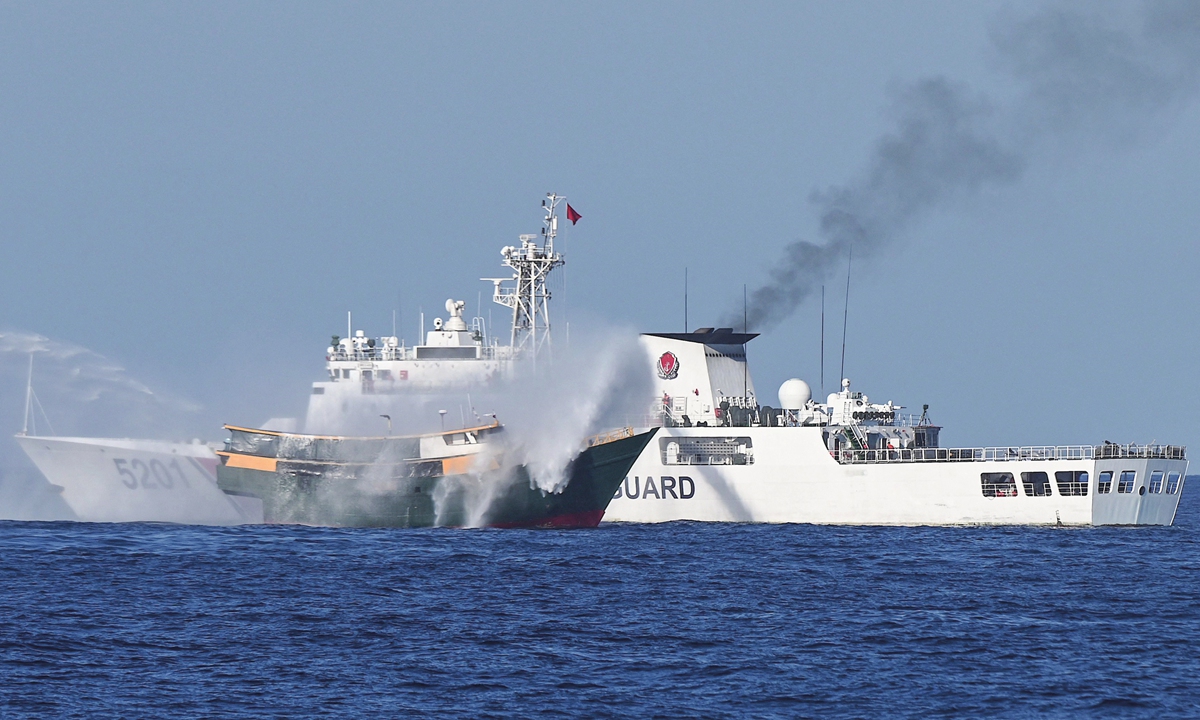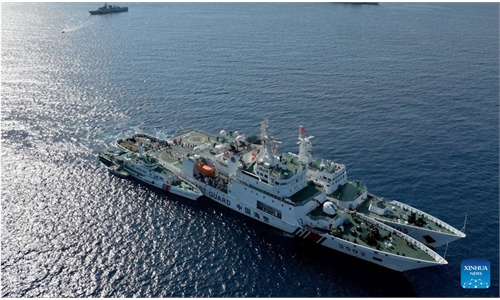Marcos’s remarks on South China Sea disregard history and truth; China to continue defense its territorial sovereignty and maritime rights: FM spokesperson

A Chinese coast guard ship uses a water cannon to expel a Philippine coast guard ship near the South China Sea during the Philippines'illegal re-supply mission on March 5, 2024. Photo: VCG
China’s normal patrol, law enforcement and productive activities in waters under its own jurisdiction are consistent with international law, including the UN Convention on the Law of the Sea (UNCLOS), and such activities are beyond reproach; the so-called arbitral award on the South China Sea is illegal, null and void, a spokesperson from China’s Ministry of Foreign Affairs said on Monday, rebuking claims made by Philippine President Ferdinand Marcos Jr. that treaties including the United Nations Convention on the Law of the Sea, the South China Sea arbitration ruling both recognize the Philippines' legal rights, which are the cornerstone of the Philippines' South China Sea policy.
In his keynote speech at the Shangri-La address in Singapore on Friday, Marcos cited treaties including UNCLOS, and the 2016 arbitral award on the South China Sea, which he claimed established a legal framework for all marine and maritime activities.
Marcos said that UNCLOS also clarified the limits of each state’s maritime zones, and defined the extent with which they could exercise sovereignty, sovereign rights and jurisdiction over those zones.
China has indisputable sovereignty over Nanhai Zhudao, and sovereign rights and jurisdiction over relevant waters. China is the first to have discovered, named, and explored and utilized Nanhai Zhudao and relevant waters, and the first to have exercised sovereignty and jurisdiction over them continuously, peacefully and effectively. China’s territorial sovereignty and maritime rights and interests in the South China Sea are based on solid historical and legal grounds. China’s normal patrol, law enforcement and productive activities in waters under its own jurisdiction are consistent with international law, including the UNCLOS, and such activities are beyond reproach, a spokesperson from China’s Ministry of Foreign Affairs said on Monday.
The spokesperson said the territory of the Philippines does not include China’s Nanhai Zhudao. The Philippine territory is defined by a series of international treaties, including the 1898 Treaty of Peace between the United States of America and the Kingdom of Spain, the 1900 Treaty between the United States of America and the Kingdom of Spain for Cession of Outlying Islands of the Philippines, and the 1930 Convention between His Majesty in Respect of the United Kingdom and the President of the United States regarding the Boundary between the State of North Borneo and the Philippine Archipelago.
China’s Nansha Qundao and Huangyan Dao are beyond the limits of the Philippine territory established by the above-mentioned treaties. The Philippines occupied by force some islands and reefs of China’s Nansha Qundao and adopted domestic legislation such as the Archipelagic Baselines Law to assert illegal territorial claims on China’s Huangyan Dao and some islands and reefs of Nansha Qundao. Those moves seriously violate China’s sovereignty and sovereign rights and international law, including the UN Charter. China firmly opposes the moves, the spokesperson noted.
The foreign ministry spokesperson claimed that so-called arbitral award on the South China Sea is illegal, null and void. Without the Chinese government’s prior consent, the Philippines unilaterally initiated an international arbitration, which violated international law, including UNCLOS, and the Declaration on the Conduct of Parties in the South China Sea (DOC). The arbitral tribunal in the South China Sea arbitration handled the case ultra vires and made an illegitimate ruling. The rendered award is illegal, null and void. China neither accepts nor participates in that arbitration, neither accepts nor recognizes the award, and will never accept any claim or action arising from the award.
China’s territorial sovereignty and maritime rights and interests in the South China Sea will not be affected by the award in any way. What the Philippines has been doing to glorify this illegal, invalid arbitral award does not help resolve its maritime disputes with China, still less justify its illegal claims in any way.
The responsibility for the recent escalation concerning the South China Sea issue between China and the Philippines lies fully with the Philippine side. The Philippines breached its commitments and the common understandings with China, violated the DOC and repeatedly acted in bad faith, the spokesperson added.
The spokesperson noted the Philippines frequently infringed on China’s rights and made provocations at sea, brought in forces outside the region to form blocs and flex muscles in the South China Sea, and spread disinformation to vilify China and mislead the international perception on this matter. In particular, driven by selfish geopolitical calculations, the US has played an extremely ignoble role by supporting and assisting the Philippines in infringing on China’s sovereignty, and by exploiting the South China Sea issue to drive a wedge between China and other regional countries.
Who exactly does the Philippine foreign policy serve now? Whose bidding is the Philippines doing with all these maritime actions? The answer is pretty clear to anyone with sound judgement. Trying desperately to justify the unjustifiable will not help the Philippines build trust with the international community. Countries in the region need to stay vigilant and always make sure that they themselves are the ones sitting in the driver’s seat when it comes to the peace and stability of the South China Sea.
With the joint efforts of China and ASEAN countries, the situation in the South China Sea is generally stable. There has been no issue at all regarding the freedom of navigation and overflight in the South China Sea that countries enjoy in accordance with law. China stands ready to continue working with ASEAN countries, including the Philippines, to manage maritime differences, deepen maritime cooperation, fully and effectively implement the DOC, actively advance the COC consultation, keep the South China Sea peaceful and stable, and ensure that the South China Sea remains a sea of peace, friendship and cooperation, said the spokesperson.
China will continue to firmly defend its territorial sovereignty and maritime interests and rights. Meanwhile, we remain committed to properly handling maritime disputes and differences through negotiation and consultation with countries directly concerned on the basis of respecting historical facts.
We urge the Philippines to honor its commitments, adhere to the limits of its territory established by the international treaties, fully and effectively implement the DOC, stop maritime infringement activities and provocations at once, and return to the right track of handling maritime disputes and differences properly through dialogue and consultation as soon as possible, said the spokesperson.
Global Times

